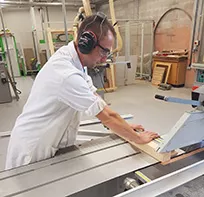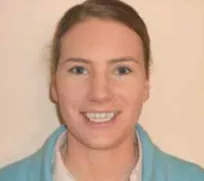Key Info
Bachelor of Education in Graphics and Construction Technology
If you are interested in teaching design-based activities within the technological subjects Materials Technology (Wood), Graphics, Design and Communication Graphics and Construction Studies, and enjoy working with people, then this course may be for you.
Key Fact: As a STEM (Science, Technology etc) programme, graduates are accredited by the Teaching Council of Ireland to teach Technology subjects at second level.
Why Study Graphics and Construction Technology concurrent with Teacher Education at UL?
UL's School of Education is the largest post-primary teacher education provider in the state and is ranked in the top 100 universities in the world for Education programmes. University of Limerick is also ranked within the top 75 universities in Europe for excellence in teaching and learning.
This is a teacher education programme which aims to provide you with the opportunity to become a successful teacher of technology subjects at second level. These subjects include;
Junior Certificate
- Wood Technology
- Graphics
Leaving Certificate
- Construction Studies
- Design & Communication Graphics
Learn more about our courses and upcoming events
What you will study
The programme is four years in duration and includes a number of school based teaching practice placements. These include a six week placement in the spring semester of year two and a further ten week placement in autumn semester of year four. These placements are designed to provide you, the student teacher, with a genuine opportunity for professional development under the supervision of faculty members of the University.
There are four streams of learning in the programme. These streams address the key knowledge areas for initial teacher education in this field. These streams are;
- Education
- Wood Technology
- Design & Communication Graphics
- Architectural Technology
- Subject Pedagogy
Throughout the programme, your knowledge, skills, values and attitudes in each of these areas are continually developed while placing a strong emphasis on your development as a critical, reflective and skilled teacher. The module content has been carefully selected to be relevant to the requirements of the Leaving Certificate and Junior Certificate syllabuses in the Technology subjects.
In Year three and four you will continue to study Education as well as Architectural Technology, and Design and Communication Graphics. You will also complete a research-driven module, which gives you an opportunity to reflect on your School Placement experiences and propose how to develop an aspect of your discipline or you as a professional.
|
|
Semester 1 |
|
Semester 2 |
|
PN4011 |
Design and Communication Graphics 1 |
PN4012 |
Design and Communication Graphics 2 |
|
PN4021 |
Process Technology 1 |
PN4042 |
Wood Technology & Design 1: Processing Principles and Skills |
|
MA4701 |
Technological Mathematics 1 |
PN4032 |
Wood Technology & Design 2: Wood Science and Forest Resources |
|
ET4003 |
Electro Technology (Ed) |
EN4042 |
Professional Digital Competence for Teaching |
|
EN4051 |
Contemporary Understandings on Education: Philosophical Perspectives |
EN4052 |
Understanding Young People and how they Learn: Psychological Perspectives |
|
|
Semester 3 |
|
Semester 4 |
|
PN4023 |
Design and Communication Graphics 3 |
En4054 |
Understanding Classroom and School Practices |
|
EY4003 |
Subject Pedagogics 1 (Wood Technology and Graphics) |
TP4024 |
School Placement |
|
PN4053 |
Wood Technology and Design 3: Material processing Practice and Safety |
|
|
|
PN4043 |
Classroom Practice in Technology Education (Wood Technology and Graphics) |
|
|
|
EN4033 |
Planning for Learning |
|
|
|
|
Semester 5 |
|
Semester 6 |
|
PN4025 |
Design and Communication Graphics 4 |
PN4036 |
Design and Communication Graphics 5 |
|
PN4065 |
Construction Technology 1 |
PN4046 |
Subject Pedagogics 2 (Construction Studies and Graphics) |
|
WT4055 |
Wood Technology and Design 4: Advanced Processing Technologies |
PN4066 |
Construction Technology 2 |
|
EN4035 |
Curriculum and Assessment: Policy and Practice |
PN4076 |
Construction Technology 3 |
|
EN4045 |
Diversity and Social Justice in Education: Sociological Perspectives |
EN4046 |
Diversity of Learners: Inclusion and Special Educational Needs |
|
|
Optional |
|
|
|
GA4006 |
An Ghaeilge Ghairmiuil |
|
|
|
|
Semester 7 |
|
Semester 8 |
|
TP4017 |
School Placement |
PN4038 |
Design and Communication Graphics 6 |
|
|
|
PN4068 |
Technology Teacher as Researcher |
|
|
|
WT4028 |
Construction Technology 4: Project and Skills |
|
|
|
WT4048 |
Health and Safety in Technology Education |
|
|
|
EN4008 |
Teacher as Professional |
Entry requirements
| CAO points history |
475 †
|
|---|---|
| Minimum grades |
Applicants are required to hold at the time of enrolment the established Leaving Certificate (or an approved equivalent) with a minimum of six subjects which must include: Two H5 (Higher level) grades and Four O6 (Ordinary level) grades or four H7 (Higher Level) grades. Subjects must include Mathematics, Irish or another language, and English. |
| Subject requirements |
In addition, applicants must hold an O3/ H7 grade in Mathematics and an O4/ H7 grade in at least one of the following: Applied Mathematics, Physics, Chemistry, Physics with Chemistry, Engineering, Design and Communication Graphics, Technology, Construction Studies, Agricultural Science, Biology. Garda vetting is required. |
| Additional considerations |
We welcome applications from mature students. Mature applicants must apply through the Central Applications Office (CAO) by 1 February. Application information for mature student applicants QQI Pathways information available here. Note: the University’s Special Mathematics Examination is applicable to this programme. More information available Internal Transfers 2 . Transfer at the end of semester 1/ beginning of semester 2: As semester 1 is common to both LM094 & LM095 it is possible to transfer from LM095 to LM094 and continue to semester 2. Internal transfers are subject to the relevant policy. Check the policy for up-to-date information. • you must have completed at least one full semester at UL, including exams, • there must be places available on the course, • you must meet the CAO points requirement on the year they entered UL, including any HEAR / DARE points reduction, 3. Transfer at the end of first year: If you finish first year in LM095 and then decide to transfer In semester 2, LM094 and LM095 have TWO different modules. If you transfer from LM095 to LM094 at the end of first year, you will have to go back to the start of semester 2 and do the modules from LM094 that you missed on a ‘Link in’ basis (i.e. essentially repeat year 1 but just to do those modules in semester 2 that are unique to LM094). There is no way around this; it will take a year. Also, you will have to pay full fees for these two modules. The same principle applies if you transfer at any later stage; go back to semester 2 of first year and start there; linking in and paying for all the modules that you need to make up. The above policy link has more detailed information and a link to the internal transfer application form. |
| Non-EU Entry Requirements |
|
How to apply
| Where are you applying from? | How to Apply |
|---|---|
| Ireland | Irish students must apply to UL via the CAO. More information can be found here. |
| The UK | Students who have completed their A-Levels can apply to UL via the CAO. More information can be found on the Academic Registry website. |
| The EU | EU Students can apply to UL via the CAO. More information can be found on the Academic Registry website. |
Fees and funding
Student course fees are broken into three components - Student contribution, Student Levy and Tuition Fees.
A number of illustrative examples of fees for this course based on the current fee levels have been set out in the tables below.
An explanation of the components, how to determine status and the criteria involved is provided below the examples as is a list of possible scholarships and funding available.
EU Students with Free fees status in receipt of a SUSI grant
| HEA pays | Tuition Fees | €4,262 |
| SUSI pays | Student contribution | €3,000 |
| Student pays | Student Levy | €102 |
| Total | €7,364 |
EU Students with Free fees status not in receipt of a grant
| HEA pays | Tuition Fees | €4,262 |
| Student pays | Student contribution | €3,000 |
| Student pays | Student Levy | €102 |
| Total | €7,364 |
Students with EU fee status not in receipt of a grant
| Student pays | Tuition Fees | €4,262 |
| Student pays | Student contribution | €3,000 |
| Student pays | Student Levy | €102 |
| Total | €7,364 |
Non-EU Students
| Student pays | Tuition Fees | €21,798 |
| Student pays | Student Levy | €102 |
| Total | €21,900 |
Student course fees are comprised of the following components:
Student Contribution
Annual charge set by the government for all full-time third level students. All students are liable unless they have been approved for a grant by Student Universal Support Ireland (SUSI). Please refer to https://www.studentfinance.ie to determine your eligibility for a grant and for instructions on how to apply. The current student contribution is set at €3000.
Student Levy
All students are liable to pay the Student Levy of €102. Please note the Student Levy is not covered by the SUSI Grant.
Tuition Fees
These are based on Residency, Citizenship, Course requirements.
Review the three groups of criteria to determine your fee status as follows
-
Residency
- You must have been living in an EU/EEA member state or Switzerland for at least 3 of the 5 years before starting your course
-
Citizenship
- You must be a citizen of an EU/EEA member state or Switzerland or have official refugee status
-
Course Requirements
(all must be met)
- You must be a first time full-time undergraduate (Exceptions are provided for students who hold a Level 6 or Level 7 qualification and are progressing to a Level 8 course in the same general area of study).
- You must be undertaking a full-time undergraduate course of at least 2 years' duration
- You cannot be undertaking a repeat year of study at the same level unless evidence of exceptional circumstances eg serious illness is provided (in which case this condition may be waived)
Depending on how you meet these criteria your status will be one of the following -
- Free Fee Status: You satisfy all three categories (1, 2 and 3) and therefore are eligible for the Higher Education Authority’s Free Fees scheme.
- EU Fee Status: You satisfy both the citizenship and residency criteria but fail to satisfy the course requirements and are liable to EU fees.
- Non EU Fee Status: You do not meet either the citizenship or residency criteria and are therefore liable to Non EU fees.
More information about fees can be found on the Finance website
These scholarships are available for this course
| Title | Award | Scholarships Available |
|---|---|---|
| Johnson and Johnson WiSTEM2D Programme |
These scholarships are available for all courses
| Title | Award | Scholarships Available |
|---|---|---|
| All Ireland Scholarships - sponsored by J.P. McManus | €6,750 | 125 |
| Brad Duffy Access Scholarship | €5,000 for one year | 1 |
| Bursary for my Future Scholarship | €2,750 one off payment | 4 |
| Civic Engagement Scholarship | €1500 | 1 |
| Cooperative Education Award | 1 medal per faculty | |
| Elaine Fagan Scholarship | €1,500 | |
| Financial Aid Fund | ||
| Hegarty Family Access Scholarships | €5,000 for one year | 2 |
| Higher Education Grants & VEC Grants | ||
| Irish American Partnership Access Scholarships | €5,000 | 2 |
| Paddy Dooley Rowing Scholarship | €2,500 | |
| Plassey Campus Centre Scholarship Programme | ||
| Provincial GAA Bursaries Scheme | €750 | |
| Stuart Mangan Scholarship | ||
| The Michael Hillery and Jacinta O’Brien Athletics Scholarship | Various benefits equating to over €7,000 in value | |
| UL Sports Scholarships | Varies depending on level of Scholarship | Multiple |
Your future career
Employability skills from this degree
- Design skills to complement technical know-how
- Strong communication and leadership skills
- An analytical mind with strong problem-solving ability
- Strong leadership and organisation skills
- The ability to work on your own initiative and as part of a team
- High levels of creativity, imagination and vision
- The ability to work well under time and budget pressures
- Must enjoy working with your hands and be willing to work outdoors
Further Study Options
- Higher Diploma in Software Development
- MSc in Project Management
- Professional Diploma in Mathematics for Teaching
- MSc in Sustainable Energy System Management
Job titles for graduates with this degree
Graduates progressing directly into employment take up a wide variety of roles. The following provides a sample of initial roles listed on the Graduate Outcomes Survey by graduates approximately one year after graduation:
- Secondary School Teacher
- Construction Studies Teacher
- Design and Communication Graphics Teacher
- Wood Technology Teacher
- Graphics Teacher
- Design and Technology Teacher
- Head of Graphics Department/Teacher
- Design Consultant
- Researcher
- Fire Safety Engineer
- Quality Assurance Technician
- Customer Service Advisor
Student Profiles

Sean O’ Riordan
During secondary school, my two favourite subjects by far were woodwork and technical graphics. This continued after my Leaving Cert where I worked as a carpenter for 3 years - this experience gave me valuable practical skills which have helped me to date in this course. What I noticed after school is how much I enjoyed working with people so the idea of being able to work with students by teaching my favourite subjects is what helped me in deciding to return to college.
Throughout the course, the emphasis is always brought back to teaching which is so very relevant to the course. There is a good mix of practical and theory and the coursework really helps to develop you as a student teacher. Teaching placement gives you the opportunity to grow in confidence and develop your teaching skills in the classroom. UL has an excellent atmosphere with brilliant support available for students from the course lecturers and tutors. I would recommend anyone considering this course to visit the campus and maybe get in touch with current students or graduates of the programme. If you have a flair for practical/design-based subjects and want to teach, then Technology Education at UL might be the course for you.
Fiona Lafferty
When I came to UL for the open day, I loved the fact that all the facilities were on the one campus. This course provided me with the most direct route to becoming a second level teacher of Technology subjects. At second level, I discovered I had a flair for craft, design, working with my hands and interacting with young adults.
Most of the course is practical, with lots of marks allocated to projects. There is an excellent mix of subjects. I love the practical elements of the course where we are encouraged to express ourselves creatively. The lecturers are very approachable and helpful.
I spent sixteen weeks on teaching practice placement, which was great in developing my teaching skills. This experience will benefit me greatly as I embark on a career as a second level teacher of technology subjects.


Patrick Kelly
I developed a great interest in technology subjects from an early stage in school. I really loved Materials Technology Wood and drawing, but I also enjoyed working with other students and teachers, so I felt that this course would be a good option for me. The course itself is fast-paced and challenging, but very enjoyable and rewarding. There is a great mix of practical and project work throughout the four years. The lecturers are very helpful and supportive and are always ready to lend a hand.
Design and creativity are strongly encouraged throughout the course, along with an emphasis on teaching and learning. All aspects of the course are linked to education; during the teaching placement, one gets a great chance to experience school life and teaching in front of a class. I feel that I have been given a great chance to develop as a professional and as a person before starting out in my teaching career.
